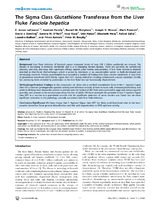Mostrar el registro sencillo del ítem
The Sigma Class Glutathione Transferase from the Liver Fluke Fasciola hepatica
| dc.contributor.author | LaCourse, E. James | |
| dc.contributor.author | Perally, Samirah | |
| dc.contributor.author | Morphew, Russell M. | |
| dc.contributor.author | Moxon, Joseph V. | |
| dc.contributor.author | Prescott, Mark | |
| dc.contributor.author | Dowling, David J. | |
| dc.contributor.author | O'Neill, Sandra M. | |
| dc.contributor.author | Kipar, Anja | |
| dc.contributor.author | Hetzel, Udo | |
| dc.contributor.author | Hoey, Elizabeth | |
| dc.contributor.author | Brophy, Peter M. | |
| dc.contributor.author | Pérez, José | |
| dc.contributor.author | Zafra Leva, Rafael | |
| dc.contributor.author | Buffoni Perazzo, Leandro | |
| dc.date.accessioned | 2013-04-09T12:24:59Z | |
| dc.date.available | 2013-04-09T12:24:59Z | |
| dc.date.issued | 2012 | |
| dc.identifier.uri | http://hdl.handle.net/10396/9644 | |
| dc.description.abstract | Background: Liver fluke infection of livestock causes economic losses of over US$ 3 billion worldwide per annum. The disease is increasing in livestock worldwide and is a re-emerging human disease. There are currently no commercial vaccines, and only one drug with significant efficacy against adult worms and juveniles. A liver fluke vaccine is deemed essential as short-lived chemotherapy, which is prone to resistance, is an unsustainable option in both developed and developing countries. Protein superfamilies have provided a number of leading liver fluke vaccine candidates. A new form of glutathione transferase (GST) family, Sigma class GST, closely related to a leading Schistosome vaccine candidate (Sm28), has previously been revealed by proteomics in the liver fluke but not functionally characterised. Methodology/Principal Findings: In this manuscript we show that a purified recombinant form of the F. hepatica Sigma class GST possesses prostaglandin synthase activity and influences activity of host immune cells. Immunocytochemistry and western blotting have shown the protein is present near the surface of the fluke and expressed in eggs and newly excysted juveniles, and present in the excretory/secretory fraction of adults. We have assessed the potential to use F. hepatica Sigma class GST as a vaccine in a goat-based vaccine trial. No significant reduction of worm burden was found but we show significant reduction in the pathology normally associated with liver fluke infection. Conclusions/Significance: We have shown that F. hepatica Sigma class GST has likely multi-functional roles in the hostparasite interaction from general detoxification and bile acid sequestration to PGD synthase activity. | es_ES |
| dc.format.mimetype | application/pdf | es_ES |
| dc.language.iso | eng | es_ES |
| dc.publisher | Public Library Of Science (PLOS) | es_ES |
| dc.rights | https://creativecommons.org/licenses/by-nc-nd/4.0/ | es_ES |
| dc.source | PloS Neglected Tropical Diseases 6 (5), 1-14 (2012) | es_ES |
| dc.subject | Liver fluke | es_ES |
| dc.subject | Fasciola hepatica | es_ES |
| dc.subject | Livestock | es_ES |
| dc.title | The Sigma Class Glutathione Transferase from the Liver Fluke Fasciola hepatica | es_ES |
| dc.type | info:eu-repo/semantics/article | es_ES |
| dc.relation.projectID | Unión Europea. FOOD-CT-2005-023025 (DELIVER) | |
| dc.rights.accessRights | info:eu-repo/semantics/openAccess | es_ES |

